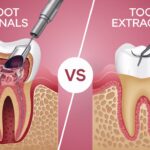Within the field of cosmetic dentistry, dental bonding is a versatile and effective solution for various dental imperfections. Whether you’re dealing with chipped teeth, discoloration, or minor gaps, dental bonding can enhance the appearance of your smile with natural-looking results. In this guide, we’ll delve into the intricacies of dental bonding, including the bonding material used, the procedure itself, and essential tips for maintaining bonded teeth.
What is Dental Bonding?
Dental bonding, also known as tooth bonding or composite bonding, is a cosmetic dental procedure aimed at improving the appearance of teeth affected by imperfections such as chips, cracks, stains, or gaps. This procedure involves applying a tooth-colored composite resin material directly onto the tooth surface to enhance its shape, color, or size. Dental bonding is a minimally invasive and cost-effective alternative to more extensive cosmetic treatments like porcelain veneers or dental implants.
The Dental Bonding Material
The primary material used in dental bonding is composite resin, a tooth-colored substance composed of a mixture of plastic and glass. Composite resin is highly versatile, allowing dental professionals to precisely match the shade of the surrounding natural teeth for seamless integration. Additionally, composite resin bonds well with tooth enamel, providing durable and aesthetically pleasing results.
The Dental Bonding Procedure
Initial Consultation
The dental bonding process typically begins with an initial consultation with your dentist. During this appointment, you can discuss your goals and expectations for the procedure, as well as any concerns or questions you may have. Your dentist will examine your teeth and gums to determine whether dental bonding is the appropriate solution for your specific needs.
Tooth Preparation
Unlike some cosmetic procedures that require extensive enamel removal, dental bonding typically requires minimal preparation of the tooth surface. Your dentist may roughen the tooth slightly and apply a conditioning liquid to enhance the bond between the composite resin and the tooth.
Composite Resin Application
Once the tooth is prepared, your dentist will carefully apply the composite resin material to the desired areas, sculpting and shaping it to achieve the desired shape and contour. Multiple layers of resin may be applied to ensure optimal strength and aesthetics.
Bonding and Curing
After the composite resin is applied, your dentist will use a special light to harden or cure the material. This process ensures that the bonding material adheres securely to the tooth surface. Once cured, your dentist will further trim and polish the bonded tooth to achieve a natural-looking appearance that seamlessly blends with your surrounding teeth.
Advantages of Dental Bonding
- Minimally Invasive: Dental bonding requires minimal removal of tooth enamel compared to other cosmetic procedures, preserving more of the natural tooth structure.
- Versatility: Dental bonding can address a wide range of cosmetic imperfections, including chips, cracks, stains, and gaps, providing comprehensive smile enhancement.
- Natural Appearance: The composite resin material closely mimics the appearance of natural tooth enamel, resulting in a seamless and aesthetically pleasing smile.
- Cost-Effective: Dental bonding is often more affordable than alternative cosmetic treatments such as porcelain veneers or dental implants, making it accessible to a broader range of patients.
Maintaining Bonded Teeth
While dental bonding is a durable and long-lasting solution for improving the appearance of your smile, proper maintenance is essential to ensure optimal results. Here are some tips for maintaining bonded teeth:
Practice Good Oral Hygiene
Maintaining good oral hygiene practices is crucial for preserving the longevity of bonded teeth. Brush your teeth at least twice a day with fluoride toothpaste and floss daily to remove plaque and food particles that can contribute to decay and discoloration.
Attend Regular Dental Checkups
Visit your dentist regularly for professional cleanings and exams. Routine dental visits allow your dentist to monitor the condition of your bonded teeth and address any issues promptly.
Avoid Hard Foods and Habits
Avoid biting or chewing on hard objects such as ice, pens, or fingernails, as this can damage the bonding material and compromise the integrity of the bonded tooth. Similarly, refrain from habits like nail-biting or using your teeth as tools to prevent unnecessary stress on the bonded teeth.
Limit Staining Substances
Reduce your consumption of staining substances such as coffee, tea, red wine, and tobacco products, as these can discolor the bonding material over time. If you do consume these substances, rinse your mouth with water afterward and practice regular teeth whitening as recommended by your dentist.
Wear a Mouthguard
If you engage in contact sports or activities that pose a risk of dental trauma, wear a custom-fitted mouthguard to protect your bonded teeth from injury. This simple precaution can help prevent chips, cracks, or dislodgment of the bonding material.
Teeth Bonding FAQs
1. How long does dental bonding last?
Dental bonding is a durable cosmetic dental procedure that can last anywhere from 5 to 10 years with proper care and maintenance. However, the longevity of bonding materials may vary depending on factors such as oral hygiene practices, dietary habits, and the extent of bonding performed. Regular dental checkups and cleanings can help prolong the lifespan of bonded teeth.
2. Is dental bonding suitable for everyone?
While dental bonding is a versatile cosmetic procedure that can address various dental imperfections, it may not be suitable for everyone. Individuals with severe tooth decay, extensive damage, or significant structural issues may require alternative treatments such as porcelain veneers or dental crowns. Additionally, patients with certain oral health conditions or habits, such as teeth grinding (bruxism), may not be ideal candidates for dental bonding.
3. Can dental bonding fix severely discolored teeth?
Dental bonding can effectively conceal minor discoloration or staining on the surface of the teeth. However, severe discoloration caused by factors such as intrinsic staining or root canal therapy may require alternative cosmetic treatments such as porcelain veneers or professional teeth whitening. Your dentist can assess the cause of tooth discoloration and recommend the most suitable treatment option based on your individual needs.
4. How does dental bonding compare to porcelain veneers?
Dental bonding and porcelain veneers are both cosmetic dental procedures aimed at improving the appearance of teeth affected by imperfections such as chips, cracks, or discoloration. While both treatments can achieve natural-looking results, there are some key differences to consider. Dental bonding is a more conservative and less invasive procedure that typically requires minimal enamel removal and can be completed in a single visit. In contrast, porcelain veneers are custom-made ceramic shells that are bonded to the front surface of the teeth, providing a more durable and long-lasting solution.
5. Can bonded teeth be whitened?
Yes, bonded teeth can be whitened using professional teeth whitening treatments administered by a dental professional. However, it’s essential to note that the bonding material itself cannot be whitened or bleached. Therefore, any existing dental bonding will remain the same color, while the natural teeth surrounding the bonded areas can be lightened to achieve a more uniform appearance. Your dentist can recommend the most appropriate whitening method based on your specific needs and preferences.
6. Is dental bonding covered by dental insurance?
The coverage for dental bonding may vary depending on your dental insurance plan and the specific circumstances surrounding the procedure. While some insurance plans may cover a portion of the cost of dental bonding if it is deemed medically necessary, cosmetic procedures such as dental bonding are often considered elective and may not be covered.
7. Can dental bonding fix gaps between teeth?
Yes, dental bonding can effectively close small gaps or spaces between teeth, providing a more uniform and aesthetically pleasing smile. Your dentist can carefully apply composite resin material to the edges of the adjacent teeth to fill in the gap and create a seamless appearance. However, for larger or more complex cases of spacing issues, alternative treatments such as orthodontics or porcelain veneers may be recommended.
8. Are there any limitations or restrictions after dental bonding?
While dental bonding is a relatively simple and non-invasive procedure, there are some precautions to consider to ensure the longevity of the bonded teeth. Avoid biting or chewing on hard objects, as this can chip or damage the bonding material. Additionally, minimize the consumption of staining substances such as coffee, tea, or tobacco to prevent discoloration of the bonding material. Maintaining good oral hygiene practices and attending regular dental checkups are essential for the ongoing health and maintenance of bonded teeth. If you have any concerns or questions about post-bonding care, consult with your dentist for personalized guidance and recommendations.
9. Can dental bonding be used to repair chipped or cracked teeth?
Yes, dental bonding is an excellent solution for repairing minor chips or cracks in teeth. Your dentist can carefully sculpt and shape the composite resin material to fill in the damaged areas and restore the tooth’s natural appearance and function. Dental bonding can provide a quick and effective solution for addressing cosmetic imperfections without the need for more extensive treatments.
10. How much does dental bonding cost?
The cost of dental bonding can vary depending on factors such as the extent of treatment, the complexity of the case, and the location of the dental practice. In general, dental bonding is considered a more affordable cosmetic dental procedure compared to alternatives such as porcelain veneers or dental implants. It’s essential to consult with your dentist for a personalized treatment plan and cost estimate based on your individual needs and goals.
Visit URBN Dental for Cosmetic Dental Bonding
Dental bonding offers a convenient and effective solution for enhancing the appearance of your smile without the need for extensive procedures or significant expense. By utilizing composite resin material and advanced bonding techniques, dental professionals can address various cosmetic imperfections with natural-looking results. Whether you’re dealing with chipped teeth, discoloration, or minor gaps, dental bonding can help you achieve the smile of your dreams.
At URBN Dental, we specialize in cosmetic dentistry procedures, including dental bonding, to help our patients achieve optimal oral health and aesthetics. With multiple convenient locations throughout Houston, including Uptown, Midtown, Montrose, and more, we’re dedicated to providing comprehensive dental care tailored to your individual needs. Contact us today to schedule a consultation and discover how dental bonding can transform your smile.
Sources:
The Effect of Resin Bonding on Long-Term Success of High-Strength Ceramics. (2018).
Predictable bonding of adhesive indirect restorations: factors for success. (2021).















